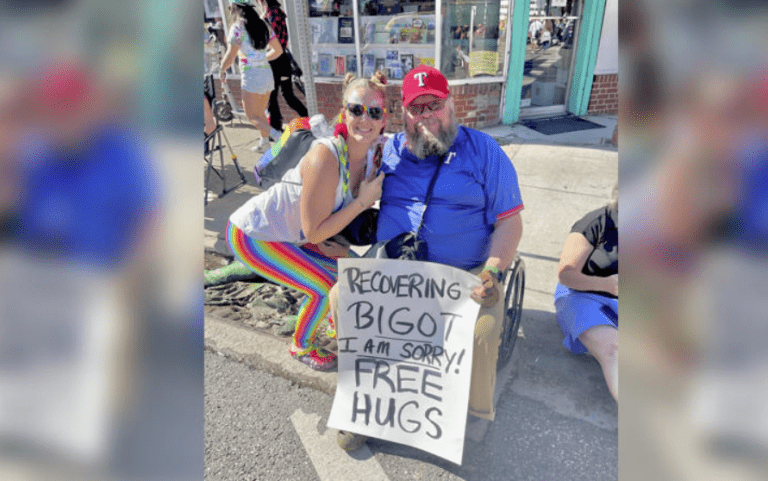
Justin Nash felt the need to apologize. He wasn’t sure if anyone at the Denver Pride Parade would welcome it, but he was convinced he had to try. After changing his lunch plans, he set out for the parade to share his apology, written in marker on a poster board, with as many people as possible.
The 53-year-old sat in his wheelchair along the parade route, looking slightly out of place in a Texas Rangers ball cap and chinos. Still, he gave a sheepish smile and held up a sign for the brightly colored streams of passersby to see. His sign read, “Recovering bigot. I am sorry!” It added that Nash was offering free hugs.
The marchers who passed through downtown Denver took him up on his offer, again and again, as onlookers cheered. One person said, “You are forgiven, and we love you and thank you.” Another person gave him a necklace of rainbow-colored flowers. Videos and photos of the “recovering bigot” went viral as Nash’s special message of humility and support resonated on social media. Nash told The Washington Post he didn’t do it as a stunt and didn’t plan to attend the parade that day.
Instead, Nash had driven to Denver with his wife from their home in Amarillo, Texas, to visit family. However, when he learned about the city’s Pride parade, he saw the chance to continue a lengthy, personal journey. For about 20 years, he had been on a journey to unlearn beliefs about the LGBTQ+ community that he internalized from his past religious beliefs and family growing up in the Texas panhandle, beliefs he now regrets.
View this post on Instagram
Nash said, “For me to sit in that parade with that sign was 20 years in the making.” He described his previous beliefs in uncertain terms. He was taught that being gay is wrong. He’s never yelled hateful things or outright shunned someone over it, but he remembered an upbringing where some family and friends cavalierly dismissed other sexualities and races in crude terms. It left Nash feeling uncomfortable with colleagues and friends who were gay, saying, “It was like anyone that was different from you was not okay.”
Kaylie Miller, who attended the parade with her wife, Ashley, quickly spotted Nash as she approached the block where he sat holding his sign. At first, she feared he was a protester. Then she got closer and read his sign. “I was so overcome with joy,” Miller said. “I just literally started jumping up and down across the crosswalk.”
Miller ran over to Nash and asked if Ashley could take a picture of them. “He said to me, ‘Only if I get to look you in the eyes and say I’m sorry and give you a hug first,’” Miller recalled. A steady stream of marchers peeled off from the street to embrace Nash throughout the morning. He counted them, 76 hugs in total. In snatches of conversation, people thanked him and asked him about his past.
“I learned a lot about love and inclusion from the people that I previously had a barrier against,” he said. Nash is glad, if a little taken aback, that his story has reached so far. It was the urging of friends and family that pushed him to change his views, he said. He hopes he can pay it forward.
